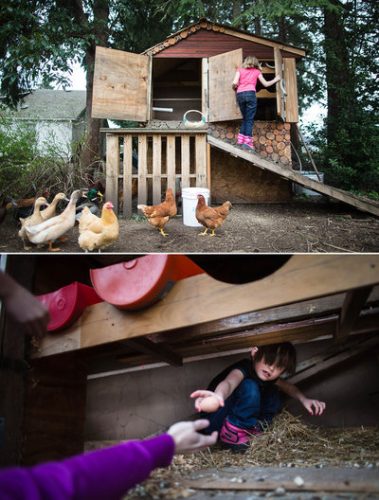
Warm summer days picking apples for homemade applesauce and canning with Grandma in a hot kitchen are memories Annika Parrott cherishes — ones she hopes to pass on to her daughters. Parrott is one of the many people living in Eugene who has turned back the clocks 100 years and started urban homesteading.
An urban homestead is a household that produces a significant part of the foods, including produce and livestock, that are consumed by its family, with a focus on the family’s desire to live in a more environmentally conscientious manner.
“It’s a lifestyle,” Parrott says. “I try to grow what I eat, and try to eat what I grow.”
Urban homesteading can be scaled to an individual’s backyard size and the amount of time they have to invest, Santa Clara resident ErinMarie Langsdorf says.
Homesteaders can start with a simple flock of hens for eggs and graduate to milking a dairy goat daily, turning the milk into cheese and yogurt, or expand to growing vegetables and fruit or raising livestock for meat.
Langsdorf’s Santa Clara urban homestead makes use of every inch of its 9,538 square-foot lot. It consists of five laying hens, a large garden with more than 20 varieties of fruits and vegetables, multiple fruit trees and Cascade and Magnum hops for her husband’s homebrew operation.
To preserve harvest for the winter, homesteaders must spend hours turning raw produce into canned, dehydrated and frozen foods. Ideally, this is enough food for fall and winter.
“We typically start really pining for the growing season in February, as our homegrown stash dwindles and I have to become more creative with cooking to use up the odds and ends,” Langsdorf says.
Kimmy Gustafson, who has an urban homestead in the Oakway neighborhood, says, “It doesn’t take much time at all. Just do one thing at a time and find shortcuts where you can. For example, instead of weeding and turning my garden this year I put my chickens in my garden in their chicken tractor, and they did it for me.”
The journey from newbie to seasoned homesteader can start with a simple tomato in a pot on a porch step and grow from there.
“I think the most important aspect is to not find yourself overwhelmed in it but rather satiated,” Langsdorf says. “Talk to farmers at local markets about their process, visit farms and other families making this work to glean whatever knowledge you can. Use the incredible local resources we have here in Eugene such as The Backyard Farmer and Territorial Seed. Most of all, do not let it intimidate you.”
The connection between soil and soul is an important aspect to urban homesteaders, and it teaches their children valuable lessons.
“Our culture has become convenience oriented and so fast-paced,” says Monet Bloom, who is just beginning her urban homestead. “We miss out on the little things like being out in the cold outdoors and getting warmed up by the sun. Getting down on your hands and knees to work in the soil. There is something primeval about working the soil with your hands.”
For Parrott, the time spent urban homesteading saves her family enough money to allow her to stay at home and take care of her children and grandmother. Their weekly grocery budget for a family of six is about $50, a far cry from the $329.30 a week the USDA considers a moderate average cost of food for a family similar in size to the Parrott’s family.
“I am not putting out any money; this is all leftover scrap stuff that nobody thinks to use anymore,” Parrott says. “Back in the day you used what you had.”
Parrott says she believes that being able to run down to the grocery store has taken away our perspective on food.
“Our thought process goes: ‘Oh, I just bought it at the store, it’s bad, I’ll just throw it away,’” she says. “If you are actually raising this chicken and watching it grow up and then you actually have to butcher it, you are not going to overeat that chicken. You are going to respect that chicken. You are going to respect that egg.”
Urban homesteaders understand that their lifestyle is not one size fits all, but for them it makes sense.
“It’s like our body remembers,” Bloom says. “And the great feeling of accomplishment of growing your dinner. It feels healthy, relaxing, rejuvenating.”